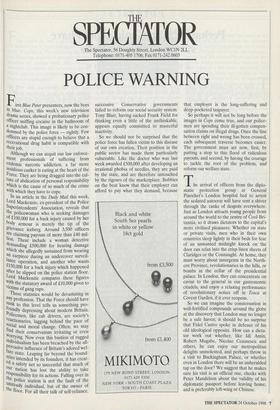SPECTAT 1HE OR
• The Spectator, 56 Doughty Street, London WC1N 2LL Telephone: 0171-405 1706; Fax 0171-242 0603
POLICE WARNING
F. irst Blue Peter presenters, now the boys
in blue. Cops, this week's new television drama series, showed a probationary police officer sniffing cocaine in the bathroom of a nightclub. This image is likely to be con- demned by the police force — rightly. Few Officers are stupid enough to believe that a recreational drug habit is compatible with their job.
Although we can acquit our law enforce- ment professionals of suffering from endemic narcotic addiction, a far more insidious canker is eating at the heart of the Force. They are being dragged into the cul- ture of abdication of personal responsibility Which is the cause of so much of the crime with which they have to cope.
In an article in the Daily Mail this week, Lord Mackenzie, ex-president of the Police SuPerintendents' Association, reveals that the policewoman who is seeking damages Of £100,000 for a back injury caused by her b°dY armour is merely the tip of the grievance iceberg. Around 3,500 officers are claiming payouts of more than £40 mil- lion. These include a woman detective demanding £500,000 for hearing damage Which she allegedly sustained from wearing ari earpiece during an undercover surveil- lance operation, and another who wants 4150,000 for a back injury which happened after he slipped on the police station floor. Lord Mackenzie compares these figures With the statutory award of £10,000 given to victims of gang rape. These statistics would be devastating in any profession. That the Force should have sunk to this level tells us something pro- f_tnindly depressing about modern Britain. e olicemen, like cab drivers, are society's reactionaries, lagging behind the pace of !new and moral change. Often, we may nnd their conservatism irritating or even Worrying. Now even this bastion of rugged individualism has been breached by the all- Pervasive influence of Britain's adored wel- fare state. Leaping far beyond the bound- aries intended by its founders, it has creat- ed a safety net so successful that much of Our nation has lost the ability to take LesPonsibility for its actions. Falling over in ule police station is not the fault of the tlinsteady individual, but of the owner of he floor. For all their talk of self-reliance,
successive Conservative governments failed to reform our social security system. Tony Blair, having sacked Frank Field for thinking even a little of the unthinkable, appears equally committed to masterful inactivity.
So we should not be surprised that the police force has fallen victim to this disease of our own creation. Their position in the public sector has made them particularly vulnerable. Like the doctor who was last week awarded £500,000 after developing an irrational phobia of needles, they are paid by the state, and are therefore untouched by the rigours of the marketplace. Bobbies on the beat know that their employer can afford to pay what they demand, because
that employer is the long-suffering and deep-pocketed taxpayer.
So perhaps it will not be long before the images in Cops come true, and our police- men are spending their ill-gotten compen- sation claims on illegal drugs. Once the line between right and wrong has been crossed, each subsequent traverse becomes easier. The government must act now, first, by putting a stop to this flood of ridiculous payouts, and second, by having the courage to tackle the root of the problem, and reform our welfare state.
The arrival of officers from the diplo- matic protection group at General Pinochet's London hospital bed to arrest the sedated autocrat will have sent a shiver through the ranks of despots everywhere. Just as London attracts young people from around the world to the centre of Cool Bri- tannia, so it draws dictators to the capital's more civilised pleasures. Whether on state or private visits, men who in their own countries sleep lightly in their beds for fear of an unwanted midnight knock on the door can relax into the crisp linen sheets of Claridges or the Connaught. At home, they must worry about insurgents in the North- ern Province, revolutionaries in the hills, or bombs in the cellar of the presidential palace. In London, they can concentrate on caviar to the general in our gastronomic citadels, and enjoy a relaxing performance of revolutionary noises off in Tosca at Covent Garden, if it ever reopens.
So we can imagine the consternation in well-fortified compounds around the globe at the discovery that London may no longer be a safe haven; it should be no surprise that Fidel Castro spoke in defence of his old ideological opposite. How can a dicta- tor work out whether, like Idi Amin, Robert Mugabe, Nicolae Ceausescu and others, he can enjoy our metropolitan delights unmolested, and perhaps throw in a visit to Buckingham Palace, or whether even in London there will be an unheralded tap on the door? We suggest that he makes sure his visit is an official one, checks with Peter Mandelson about the validity of his diplomatic passport before leaving home, and is preferably left-wing or Chinese.


















































































 Previous page
Previous page